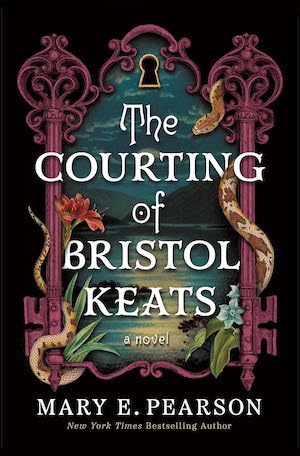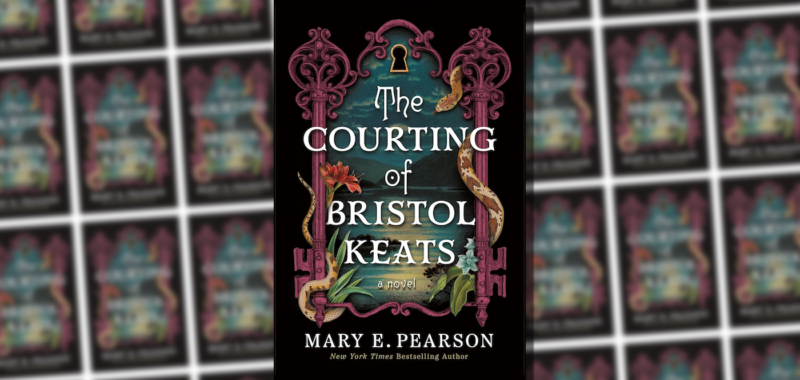Fae and romance go hand-in-hand, especially if you’ve even thought about flirting with reading any romantasy. Mary E. Pearson’s The Courting of Bristol Keats is the latest entry into this subgenre, though the book takes more of a slow burn approach and is moderately less spicy than other similarly advertised fare out there.
Within its pages, we primarily follow the titular character, a 20-something woman who lives in the small town of Bowskeep with her two sisters. The three are on their own: Her mother left them a year ago and is reported to have drowned, and their heartbroken father, months later, apparently gets gruesomely killed in a car accident. As Bristol struggles to make money to keep her surviving family afloat, she receives an invitation from an aunt of her father’s to collect a piece of artwork—a Da Vinci original!—that would be a financial godsend. Skeptical at first, she eventually meets with the aunt and her colleagues, only to discover that the “aunt” and those with her are fae. Her father, while mortal, was raised in the faerie realm of Elphame and they need her, they say, to come with them to stop a tyrant.
One of those fae is the foreboding and age-appropriate Tyghan (he is also a 20-something, only a few years older than Bristol), who is a king in Elphame and, for reasons the reader soon finds out, has a grudge against Ms. Keats. Bristol eventually agrees to help the fae when she discovers her father might be alive somewhere in the fae realm (and, of course, the money from the artwork). And so she heads to Tyghan’s castle… and pretty much stays there for the rest of the book.
To call the pace of The Courting of Bristol Keats slow is generous; events happen at a speed even a snail would call sluggish. If a fast-paced plot and epic adventure are what you’re looking for, this book should not be on your dance card. Yes, there are a handful of scenes that involve running and fighting, but those are brief interludes. That’s not a bad thing, of course, depending on what you’re looking for in a book. And Bristol Keats has solid prose and spends most of its time acquainting us with the people and land of Elphame, from the fae to Bristol’s fellow recruits, people with some fae in their blood working to develop their magical abilities.
Buy the Book


The Courting of Bristol Keats
And then, of course, there’s Tyghan. The Courting of Bristol Keats is Pearson’s first foray into adult fiction, and it has the sexy scenes to back that up… if you’re willing to wait a few hundred pages. Waiting for things to get spicy, of course, can be far from a bad thing. Here, the romance initially unfolds in an almost Victorian style, à la Elizabeth Bennet and Mr. Darcy in Jane Austen’s Pride and Prejudice as they attend various balls and other social events (or training sessions, in the case of this book). But unlike Pride and Prejudice, we see their relationship unfold from both Bristol and Tyghan’s points of view, which takes away some of the pent-up anticipation, and arguably does little to bolster the two’s chemistry. (Here might be a good place to mention that the book flits between multiple characters’ points of view—not just Bristol and Tyghan’s—sometimes even within the same page, which can make for some confusing passages.)
In the back-half, the two become an item and the book earns its romantasy description, something that will please fans of the subgenre if you buy into the intense and deep connection the two 20-somethings find after some sexy dancing. Through it all we also see Bristol uncover some secrets about her parents that the reader is explicitly clued into early on, and we also get a juicy reveal about a certain nefarious character that truly delighted me.
And while we get glimpses of Elphame through the social gatherings and training exercises where Bristol spends most of her time, I wish there was more space dedicated to describing the fae world and its magic system. The latter particularly feels half-baked—magic impacts time, for example, in a way that’s crucial to the plot. But the whole premise crumbles when, after a few seconds of consideration, you realize that there’s no way time could work that way across everyone’s lived experience in Elphame.
If the dynamic between Bristol and Tyghan works for you, however, The Courting of Bristol Keats can be a pleasant read. Bristol in particular is well-developed; you understand why she’s the way she is via the way she was raised, and the bonds she has with her sisters are the most genuine and believable in the book. For me, those relationships as well as the complexity found in her understanding and love for her parents, are what shines the most in the novel’s 560 pages.
Speaking of pages, the intrigues that are ladled out as the book progresses are far from resolved when you close the back cover. This includes the larger danger facing Elphame, as well as the changes happening within Bristol. The last page, in fact, is an ending insofar as the book ends, but nothing is resolved other than the completion of a trope that’s required for a romance story.
We leave The Courting of Bristol Keats with the tyrant still at large, Bristol’s dad still on the run, and the magical mystery around Bristol shrouded with ominous questions. On top of that, there are several elements—both characters and plot points (one of which involves a ferret!)—that appear to serve no purpose in this book. These factors will undoubtedly come into play in the potential sequel, which you’ll have to read to get an explanation to pretty much everything brought up in this one. Your mileage may vary on whether you’re up to that commitment—it’s a fine read depending on your expectations, and the book design is beautiful! Bristol Keats will find a readership, and the world will not be worse for it.
The Courting of Bristol Keats is published by Flatiron Books.

